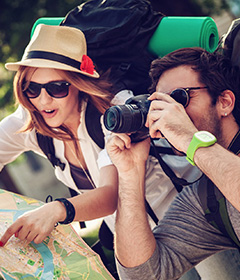Traveling abroad offers more than just breathtaking landscapes and cultural encounters; it’s a gateway to acquiring valuable new skills. As you immerse yourself in unfamiliar environments, you’ll find countless opportunities to expand your abilities and broaden your horizons. From mastering a new language to honing your digital nomad prowess, the skills gained through international travel can significantly enhance both your personal and professional life.
Whether you’re a seasoned globetrotter or planning your first overseas adventure, the potential for skill development is boundless. Let’s explore some of the most rewarding and practical skills you can cultivate while traversing foreign lands, and how these newfound abilities can enrich your life long after you’ve returned home.
Linguistic immersion techniques for rapid language acquisition
One of the most valuable skills you can develop while traveling abroad is the ability to communicate in a new language. Linguistic immersion offers a fast-track to fluency, allowing you to absorb vocabulary, grammar, and cultural nuances in a natural, context-rich environment. By employing specific techniques and leveraging local resources, you can accelerate your language learning process significantly.
Tandem language exchange platforms: HelloTalk and bilingua
Digital platforms have revolutionised the way we approach language learning while traveling. Apps like HelloTalk and Bilingua connect you with native speakers eager to engage in language exchange. These tandem learning opportunities allow you to practice your target language while helping others learn your native tongue. By engaging in real conversations with locals, you’ll pick up colloquialisms, improve your pronunciation, and gain cultural insights that textbooks simply can’t provide.
Intensive language courses: alliance française and Goethe-Institut
For a more structured approach to language acquisition, consider enrolling in intensive courses offered by reputable institutions like Alliance Française for French or Goethe-Institut for German. These organisations provide immersive language programmes tailored to various proficiency levels. By dedicating a portion of your travel time to formal study, you can rapidly build a strong foundation in grammar and vocabulary while benefiting from expert instruction and cultural activities.
Cultural assimilation through local homestays
Perhaps the most effective way to accelerate language learning is through cultural assimilation. Opting for a homestay with a local family can provide round-the-clock exposure to your target language. This immersive experience not only enhances your language skills but also offers deep insights into local customs, traditions, and daily life. You’ll find yourself picking up idiomatic expressions and cultural references that would be difficult to acquire in any other setting.
Cross-cultural communication skills in global business environments
In today’s interconnected world, the ability to navigate diverse cultural landscapes is invaluable in global business environments. Traveling abroad provides a unique opportunity to develop and refine cross-cultural communication skills that can set you apart in the international job market.
Non-verbal communication patterns across cultures
While exploring different countries, you’ll quickly realise that non-verbal cues vary significantly across cultures. From the importance of eye contact to the interpretation of personal space, these nuances play a crucial role in effective communication. By observing and adapting to local customs, you’ll develop a heightened awareness of body language and gestures, allowing you to convey respect and build rapport in diverse professional settings.
Negotiation tactics in asian vs. western business settings
Experiencing business practices in various cultural contexts can sharpen your negotiation skills. For instance, the direct approach favoured in many Western countries may be perceived as abrasive in Asian business cultures, where indirect communication and relationship-building often take precedence. By immersing yourself in these different environments, you’ll learn to adapt your negotiation style, recognising the importance of factors such as face-saving , hierarchy, and long-term relationship cultivation in different cultural contexts.
Adapting presentation styles for international audiences
Traveling abroad exposes you to diverse presentation styles and audience expectations. You might find that the data-driven approach preferred in some cultures contrasts with the storytelling emphasis in others. This exposure allows you to develop a flexible presentation style, enabling you to tailor your content and delivery to resonate with international audiences effectively. The ability to adapt your communication style is a valuable skill in global business, enhancing your effectiveness in cross-cultural team collaborations and client interactions.
Digital nomad technological proficiencies
The rise of remote work has made digital nomadism an increasingly viable lifestyle choice. Traveling abroad while maintaining professional commitments requires a specific set of technological skills. Mastering these tools can not only enhance your travel experience but also make you a more versatile and attractive candidate in the global job market.
Remote project management tools: trello and asana
Effective project management is crucial when working remotely across different time zones. Platforms like Trello and Asana have become indispensable for digital nomads. Learning to use these tools proficiently allows you to organise tasks, collaborate with team members, and track progress seamlessly. The ability to manage projects effectively from anywhere in the world is a valuable skill that translates well to many professional environments.
Virtual collaboration platforms: slack and microsoft teams
Clear communication is the cornerstone of successful remote work. Mastering virtual collaboration platforms such as Slack and Microsoft Teams is essential for maintaining connectivity with colleagues and clients. These tools offer features like real-time messaging, file sharing, and video conferencing, enabling efficient teamwork regardless of geographical boundaries. Becoming adept at using these platforms can significantly enhance your productivity and professional relationships while traveling.
Cloud-based productivity suites: G suite and office 365
Cloud-based productivity suites have revolutionised the way digital nomads work. Proficiency in platforms like G Suite and Office 365 allows you to access, create, and edit documents, spreadsheets, and presentations from any device with an internet connection. These skills are not only crucial for maintaining your workflow while traveling but are also highly valued by employers in various industries. Mastering these tools can make you a more efficient and flexible professional, capable of contributing to projects from any corner of the globe.
Culinary arts and international cuisine mastery
Exploring global cuisines is one of the most delightful aspects of travel, but it can also be an opportunity to develop valuable culinary skills. By immersing yourself in local food cultures, you can acquire techniques and knowledge that will enhance your cooking abilities and broaden your palate.
Southeast asian cooking techniques: thai curry and vietnamese pho
Southeast Asian cuisine is renowned for its complex flavours and unique cooking methods. Learning to create authentic Thai curries or master the art of Vietnamese pho can be a rewarding experience. These dishes require an understanding of balance between sweet, sour, salty, and spicy flavours, as well as techniques like stir-frying and simmering . By taking cooking classes or apprenticing in local kitchens, you can gain insights into ingredient selection, spice blending, and traditional cooking methods that will elevate your culinary skills.
Mediterranean diet principles and recipe development
The Mediterranean diet is celebrated for its health benefits and delicious simplicity. Traveling through countries like Greece, Italy, and Spain offers the chance to learn about the core principles of this dietary approach. You can develop skills in using olive oil, preparing fresh seafood, and incorporating a variety of vegetables and legumes into your cooking. Understanding the Mediterranean approach to meal planning and recipe development can inspire healthier eating habits and expand your repertoire of nutritious, flavourful dishes.
Farm-to-table practices in european agritourism
Agritourism experiences in Europe provide unique opportunities to learn about sustainable farming practices and farm-to-table cooking. By participating in harvests, cheese-making workshops, or wine production, you can gain hands-on experience in food production and preservation techniques. These skills not only enhance your culinary abilities but also deepen your understanding of sustainable food systems and seasonal cooking, which are increasingly valued in the culinary world.
Adventure sports and outdoor survival techniques
Traveling abroad often presents opportunities to engage in thrilling adventure sports and outdoor activities. Beyond the adrenaline rush, these experiences can help you develop valuable skills in risk assessment, physical endurance, and survival techniques.
Alpine mountaineering skills in the swiss alps
The Swiss Alps offer an ideal setting to learn alpine mountaineering skills. From basic techniques like using crampons and ice axes to more advanced skills in route finding and crevasse rescue, mountaineering courses in this region can significantly enhance your outdoor capabilities. These skills not only prepare you for high-altitude adventures but also foster qualities like resilience, teamwork, and decision-making under pressure, which are valuable in many aspects of life.
Scuba diving certifications in the great barrier reef
Obtaining scuba diving certifications while exploring the Great Barrier Reef can open up a whole new underwater world. Beyond learning diving techniques, you’ll gain knowledge about marine ecosystems, underwater navigation, and dive safety protocols. These skills can lead to exciting career opportunities in marine conservation, underwater photography, or dive instruction. Moreover, the focus on safety and buddy systems in diving cultivates a strong sense of responsibility and teamwork.
Wilderness first aid training for remote trekking
Embarking on remote treks requires preparation for potential medical emergencies far from professional help. Wilderness first aid courses, often available in popular trekking destinations, teach you how to handle injuries and illnesses in challenging outdoor environments. These skills, ranging from treating hypothermia to improvising splints, not only enhance your safety during adventures but also build confidence in your ability to handle crisis situations in any setting.
Sustainable travel and Eco-Tourism practices
As global awareness of environmental issues grows, learning sustainable travel practices has become increasingly important. Traveling abroad offers unique opportunities to engage with eco-tourism initiatives and develop skills in sustainable living that can be applied both during your travels and in your everyday life.
Carbon footprint reduction strategies for global travelers
Understanding and implementing carbon footprint reduction strategies is a crucial skill for the environmentally conscious traveler. This involves learning to calculate your travel emissions, choosing low-impact transportation options, and supporting carbon offset programmes. By mastering these techniques, you not only contribute to environmental conservation but also gain valuable knowledge about sustainable practices that can be applied in various aspects of life and work.
Community-based tourism initiatives in developing countries
Engaging with community-based tourism initiatives in developing countries can teach you about sustainable economic development and cultural preservation. You’ll learn how tourism can be structured to benefit local communities directly, preserving traditions while providing economic opportunities. These experiences can develop your skills in cross-cultural communication, project management, and social entrepreneurship, which are increasingly valued in the global job market.
Wildlife conservation volunteer programs in africa
Participating in wildlife conservation programmes in Africa offers hands-on experience in environmental protection and animal welfare. You might learn skills such as tracking endangered species, conducting population surveys, or assisting in anti-poaching efforts. These experiences not only contribute to conservation efforts but also develop your understanding of complex ecological systems and the challenges of balancing conservation with human needs. The problem-solving and adaptability skills gained through such programmes are highly transferable to many professional fields.
Traveling abroad is not just about seeing new places; it’s about growing as an individual and acquiring skills that can enrich your personal and professional life. From linguistic abilities to digital nomad proficiencies, culinary arts to adventure sports, and sustainable travel practices, the skills you can learn while exploring the world are as diverse as they are valuable. By approaching your travels with an open mind and a willingness to learn, you can return home not just with memories, but with a wealth of new abilities that will serve you well in our increasingly interconnected world.


